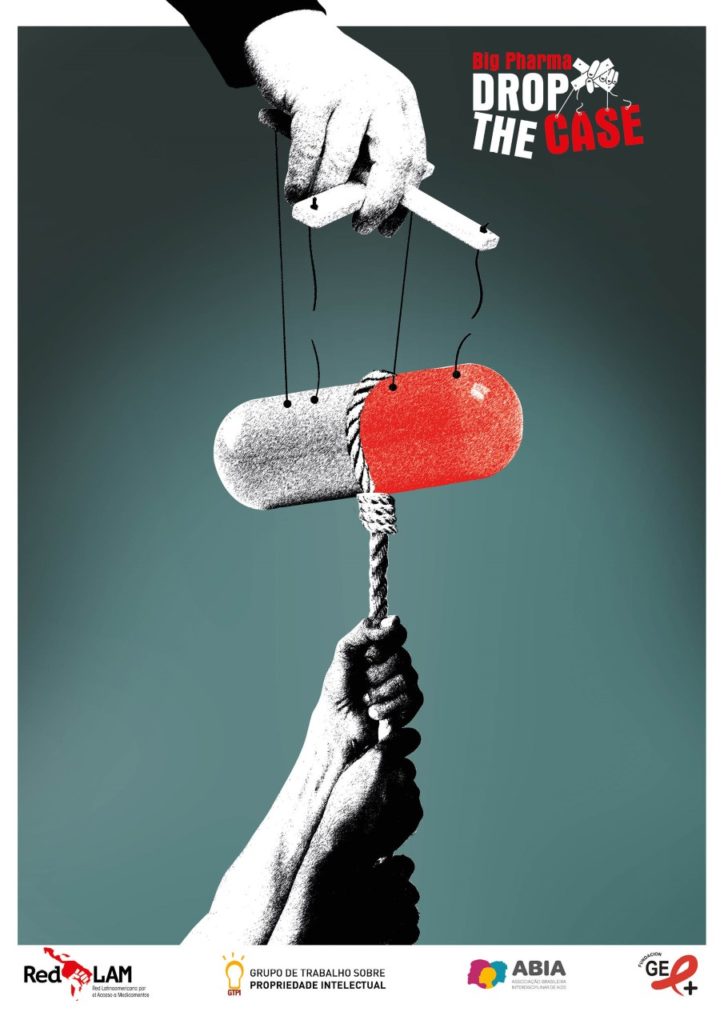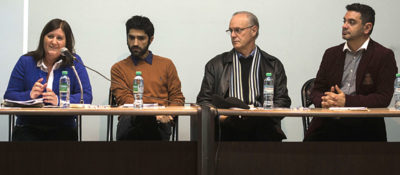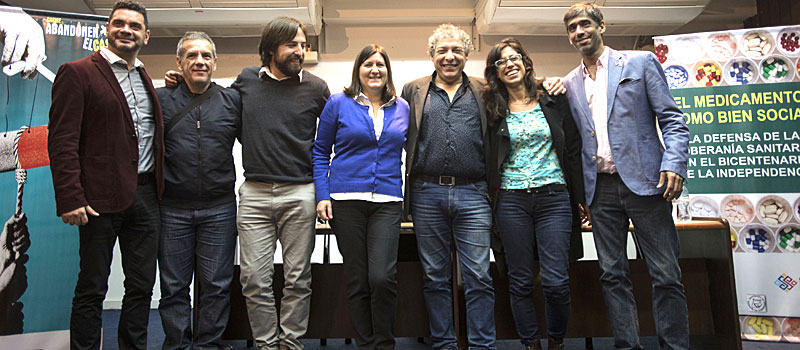Fundación Grupo Efecto Positivo (GEP), with regional partners, launches a campaign to demand that pharmaceutical companies drop their case which threatens access to medicines and public health.
 Fundación Grupo Efecto Positivo (GEP) launches “Big Pharma – Drop the case!” a national campaign to get multinational companies drop the case against the Argentine State for adopting measures to promote public health, in Buenos Aires.The campaign was launched at the “Medicines as social goods: defense of health sovereignty in the Bicentennial of Independence” seminar organized with Fundación Soberanía Sanitaria. The campaign will show support by collecting signatures of people who agree that the Argentine government should be able to create policies that protect the health of its citizens. The former Minister of Health, Dr Daniel Gollan, the Deputy and President of the Health Commission of that Chamber, Carolina Gaillard, renowned journalist Raul Dellatorre and other experts on the right to health, intellectual property and access to drugs took part in the press conference. The campaign is jointly led with other partners in the region, such as Associação Brasileira Interdisciplinar de AIDS (ABIA) in Brazil, who are defending their own health service against similar threats.
Fundación Grupo Efecto Positivo (GEP) launches “Big Pharma – Drop the case!” a national campaign to get multinational companies drop the case against the Argentine State for adopting measures to promote public health, in Buenos Aires.The campaign was launched at the “Medicines as social goods: defense of health sovereignty in the Bicentennial of Independence” seminar organized with Fundación Soberanía Sanitaria. The campaign will show support by collecting signatures of people who agree that the Argentine government should be able to create policies that protect the health of its citizens. The former Minister of Health, Dr Daniel Gollan, the Deputy and President of the Health Commission of that Chamber, Carolina Gaillard, renowned journalist Raul Dellatorre and other experts on the right to health, intellectual property and access to drugs took part in the press conference. The campaign is jointly led with other partners in the region, such as Associação Brasileira Interdisciplinar de AIDS (ABIA) in Brazil, who are defending their own health service against similar threats.
Foreign Pharmaceutical Companies Challenge new Patent Guidelines Intended to Safeguard Public Health
The lawsuit filed by the Argentinian Chamber of Medical Specialties (CAEME) along with 26 foreign pharmaceutical companies calls for the annulment of new examination guidelines for pharmaceutical patent applications. These guidelines safeguard the national patent system so that it doesn’t undermine the sustainability of Argentina’s Free Drug Provision National Programs. The guidelines’ have set standards and strict criteria for patent examination in the pharmaceutical sector that have successfully prevented several illegitimate and undeserved patents. This has enabled generic medicines to get access to the Argentine market and has led to the reduction of prices of essential life saving medicines.
Pharmaceutical Companies Seeking Unmerited Patents

From left: Lorena Di Giano, GEP’s ED, Andres Lopez (CELS), Dr. Daniel Gollan (former Minister of Health), Jose Maria Di Bello (GEP’s Secretary General)
Pharmaceutical companies seeking to build and extend exclusive rights to sell essential drugs are misusing the patent system, which was originally developed to protect intellectual property on genuinely new and innovative products. The result is that prices are made artificially high which has detrimental impacts on health budgets, and free access to medicines for the Argentinian population. For example, the price of sofosbuvir, the drug that cures hepatitis C, and whose patent application is still pending in Argentina, could represent up to 115,000% of the total budget available in the public program that supplies the drug. When Argentina has been able to purchase generic versions of medicines, there have been significant savings for the national programs, which in turn promotes more availability and access to medicines. For example, the Health Ministry bought Atripla, the key drug for the treatment of HIV, at a cost 19 times lower than that offered by the company in 2015.
“CAEME’s case against Argentina is outrageous,” says Lorena Di Giano, GEP’s Executive Director. “If this case is successful, it threatens the economic sustainability of our free provision drugs programs, both in public and social security and pre-paid. It also endangers our right to define policies to protect public health. With each pharmaceutical patent we hand over a monopoly to the company. We must defend these guidelines to ensure there is no abuse of the patent system, and so that public health can prevail”.
Under New Guidelines 96% of Patents Were Not Granted
An investigation carried out by GEP’s technical and legal team provide results that speak for themselves on the effectiveness of these guidelines. From 75 applications for pharmaceutical patents for medicines with high impact requested prior to the implementation of the new guidelines, over half (51%) of the patents were not granted. Since then, 96% of the resolved requests were denied. This is because practices such as evergreening (see our short video on evergreening) and other tactics have been prevented by the new guidelines that the companies are now seeking to challenge. This is why rigorous examination of patents in the pharmaceutical sector is vital to protect people and health systems against monopolies on essential drugs.
Civil Society Stand Up Against Big Pharmaceutical Companies
GEP has joined the case as an interested third party, and nationally launched the campaign at a press conference where it screened testimonies of people affected by access to treatment and showed a photo exhibit and shared its petition page on Change.org’s website for people to show their support.
To close the event José María Di Bello, GEP’s secretary, reminded the audience: “The active involvement of civil society with decision makers in the health sector is the only way to continue defending access to treatments. Essential medicines are a social good that guarantees the right to health. They are not, and should not, be treated simply as a commodity”.

Jose Maria Di Bello (FGEP), Pablo Garcia (REDAR Positiva), Nicolas Kreplak (Soberanía Sanitaria), Lorena Di Giano (FGEP), Raul Dellatorre, Paula Español and Alex Freyre (FGEP ) at the close of the event.




